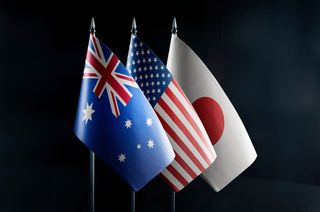The Australian
By Tom Switzer
Why is Iraq descending into chaos and sectarian conflict? To hear the Iraq war hawks, you’d think the demise of Saddam Hussein had nothing to do with the demise of the Iraqi state.
The crisis, we are told, has to do with Western inaction in Syria’s civil war, President Nouri al-Maliki’s authoritarian ways and President Barack Obama’s withdrawal of US forces in 2011.
To be sure, each explanation has merit. Syria’s Sunni terrorist fighters have spilled into Iraq and destabilised the region. Maliki has been more interested in seeking revenge against his political and sectarian rivals, especially the Sunni Arabs, than in building a nation. And the withdrawal of US troops helped scuttle the semblance of sectarian peace that Washington had brokered following the surge in 2007.
But the taproot of this disaster was the decision to launch a preventive war against Saddam in 2003. It was this event that has sparked the other contributing causes to the debacle now unfolding across Iraq.
The neo-conservative architects of the war thought that the “liberation” of the Iraqi people from a brutal dictatorship would lead to a flourishing democracy. But the Baathists, like the Hashemites, British and Ottomans before them, had kept in place minority rule, giving Sunni Arabs a disproportionate share of power and resources while brutally suppressing Shi’ites and Kurds in the process.
By invading Iraq and toppling Saddam’s regime, the US-led coalition ended that imbalance. The majority Shi’ites became the new winners, the Sunnis the new losers. The result has been a violent rebalancing act in Iraqi society.
As Vali Nasr points out in The Shia Revival and Forces of Fortune, the Sunni insurgency fought both the US occupation and the Shia ascendancy it facilitated. The insurgents wanted the Americans gone so they could restore Sunni dominance over Iraq. And with the US withdrawal, the Sunnis escalated their bloody sectarian war against the Shia-run government.
“(Shi’ites) still fear Sunni rule, and Sunnis rue their loss of power and dream of climbing back to the top,” argues Nasr. “Each has a different vision of the past and a different dream for the future. There are still scores to settle, decades of them.” To say again: it was the US invasion that shattered the Sunni-run state, which set the scene for the disaster unfolding in Iraq.
It is not, as this newspaper editorialised on Monday, just “the usual claque of left-wing commentators” who link the failure of Iraq directly to the invasion in 2003. From the outset of this misbegotten venture, several conservatives and foreign policy realists have been highly sceptical of the neo-conservatives’ grandiose plans for global social engineering and remaking Iraq in America’s image of democracy.
True, few US Republicans and Australian Liberals and Nationals marched in the streets against George W. Bush and John Howard in the countdown to war. But in Britain, the Iraq war was markedly more unpopular among Tory than among Labour voters in the northern winter of 2002–03.
Foreign Minister Julie Bishop speaks for many people when she says the removal of Saddam was “a good thing”. But the threat that the Baathist dictator posed to the US and its interests in the region could have been contained just as it had been since the Gulf war of 1991: sanctions, naval blockade, no-fly zone. Saddam was a brutal tyrant, but he was also calculating: he knew if he ever used those weapons (that Western intelligence incorrectly claimed he had), it would have met massive US retaliation.
Although the twin strategy of containment and deterrence lacked the political sex appeal of “liberation” after 9/11, it avoided the kind of unintended consequences that a liberated Iraq has delivered: sectarian violence, civil war, Islamist terrorism and the coming apart of Iraq that has cost the US and allies much in blood (4500 lives) and treasure ($US1.7 trillion), not to mention the widespread devastation wreaked on Iraqi society during the past 11 years.
Many supporters of the Iraq invasion blame Obama’s “premature” exit in 2011 for unravelling the fragile unity government and removing all that was keeping the sectarian rivals in check. Never mind that it was the Bush administration in October 2008 that pledged to withdraw all US troops by the end of 2011.
Never mind that during lengthy negotiations on keeping US forces in Iraq the Maliki government, encouraged by its main backer, Iran, insisted that all remaining US personnel be subject to Iraqi law — a demand to which Washington could not possibly agree. And never mind that Obama was fulfilling an election mandate to withdraw troops from a widely unpopular war.
Besides, it was inevitable that once Washington withdrew US forces, the hatred, rivalries and vengefulness that are so much a part of Iraqi religious, sectarian and tribal animosities would erupt. Would opponents of withdrawal in 2011 really countenance staying forever in Iraq?
The lesson is that democracy is not an export commodity, especially to arbitrarily created states and ethnically and tribally divided societies with no genuinely liberal democratic traditions.
This article was originally published at The Australian




